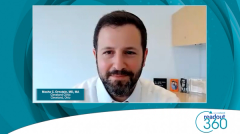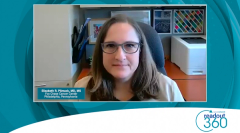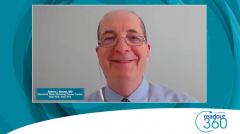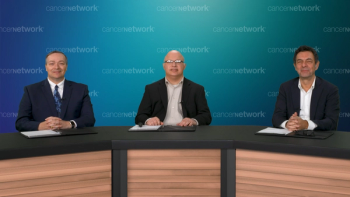
Non-Clear Cell Renal Cell Carcinoma: Interpreting Data With IO/TKI Combination Therapies
Key opinion leaders in the field of renal cell carcinoma management reflect on recent data with IO/TKI combination therapy in patients with non-clear cell disease.
Episodes in this series

Transcript:
Brian I. Rini, MD, FASCO: There [were] also some updated cabo/nivo [cabozantinib/nivolumab] [data]—since you all alluded to it somewhat—that Joe Lee also presented from the phase 2 trial. This is a little smaller trial but similar; [it] was 47 patients. They actually took the chromophobe out because chromophobe’s been historically immune unresponsive. Those 7 patients were in what’s called cohort 2, and the 40 of [those with] everything else non–clear cell—papillary, unclassified translocation—were in cohort 1. Standard cabo/nivo dose of 40 mg in this combination, as you all know.
They presented PFS [progression-free survival] and OS [overall survival] [data]; this median PFS was 13 months. So again, we’re comparing small numbers across trials but a decent PFS, as high at least numerically as [what] we saw with len/bro [lenvatinib/pembrolizumab]. And I would argue [OS] [was] a little hard to interpret in this single-arm study. And then because we like to say we can’t compare, but then go ahead and compare, these are the data for both len/pembro and cabo/nivo that we talked about. You can see there are some differences between the trials. So again, comparing small numbers, but differences between the trials. So...just a question for the group. Moshe, I’ll start with you again. You said you...use both. And is that a toxicity decision? Are you...using both...like you might in clear cell? How are you deciding if you’re giving an immune-based regimen, as you just said? How are you deciding which one to use?
Moshe C. Ornstein, MD, MA: So, for the [patients with papillary [disease]...cabozantinib [plus] nivolumab was approved first in the clear cell setting. And I shifted to that fairly quickly, even for patients with metastatic papillary RCC [renal cell carcinoma]. So that...became the default for those patients as these len/pembro data were published. And when len/pembro was approved in the clear cell setting, much like [for] the [patients with] clear cell [disease], I began to shift my practice more toward len/pembro. Just in general, again, when you look at...it head-to-head, we do see really better response rates. Overall, you’re seeing a better PFS. So, I’ve shifted my patients for the most part to len/pembro, but I do think that both of them are good options.
Brian I. Rini, MD, FASCO: Betsy, anything to add to that?
Elizabeth R. Plimack, MD, MS: No. Good summary, I agree.
Brian I. Rini, MD, FASCO: Bob, you were involved in both these trials. Do we need to do more with this? Do we need a randomized trial? Is that ever going to happen, or are we...going to just...be stuck with these phase 2 data sets and make decisions?
Robert J. Motzer, MD: What I’d like to see is a little bit more development of actual targeted drugs to these cell types.... The number of these non–clear cell types has expanded dramatically. And we really...haven’t defined good targets or drugs that target this. I’d like to see a targeted approach. The other thing that was interesting is we really felt there was no activity for IO [immuno-oncology] therapy in chromophobe, where for the most part my preferred regimen has been lenvatinib/everolimus, and then when lenvatinib is included with pembro, we are seeing some activity in this trial. So...it makes you wonder...what aspect of that, whether it’s the lenvatinib, that’s...contributing to that activity. But...this is an understudied, very difficult group to study. We may be left with it with large phase 1 trials to help us identify best therapy.
Brian I. Rini, MD, FASCO: Yeah, I was going to ask that. Len/everolimus has activity, although those trials are tiny...and people quote 44%...it’s 4 of 9 patients for everolimus. But people quote that number.
Transcript is AI-generated and edited for clarity and readability.
Newsletter
Stay up to date on recent advances in the multidisciplinary approach to cancer.






































